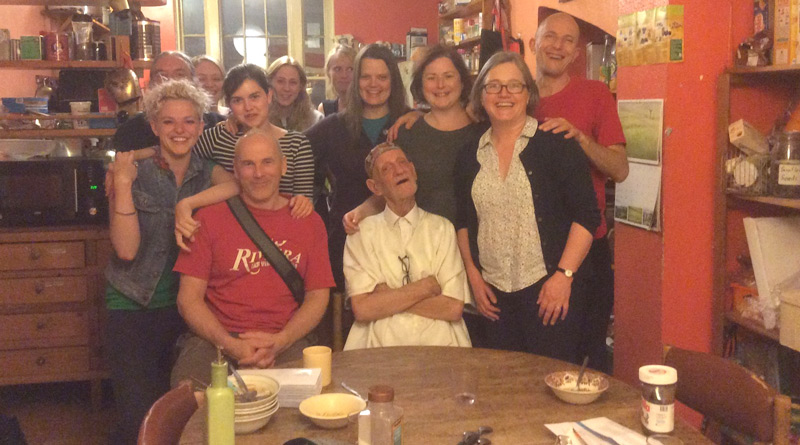The homes we live in – Learning from 39 years of shared experience
Earlier this week I visited four knocked-together houses in Islington Park St that are home to a diverse group of eighteen people, living under threat of eviction.
The property in Islington Park Street was taken on ten years ago by One Housing Group (OHG), from the now closed down Patchwork Housing Association, along with other properties, for a token one pound payment. OHG first issued notice to quit five years ago and have recently begun eviction proceedings.
This is a sadly familiar story in a city where land values are escalating and rents are too high. The residents of [Islington Park Street](http://islingtonparkstreet.org) are the most recent example of a London-wide story of unfair evictions, fuelled by the rocketing ‘value’ of property. The 18-strong community is bemused at the way the home they have shared for 39 years has fallen into the hands of a Housing Association that claims “we’re a ‘not-for-profit’ that loves to make a profit.” And talks about offering a range of support services to their “customers” including “those who find themselves homeless”. Islington Park St residents are preparing and daring to fight back for their home.
On my first visit, it immediately became clear that this was a very special place. My bike was ushered in to a bicycle storeroom that also functions as a dry food store. All over the house there are signs of collective organisation in the form of functional racks and notice boards to enable efficient living.
A big pot of soup and a huge bowl of salad seemed to feed an endless stream of people who came in and out of the kitchen and joined the urgent conversation about how to resist eviction by One Housing Group.
The house is run on cooperative principles. There is no hierarchy, residents take it in turns to chair meetings and decisions are made as a group. Some residents have lived there for more than thirty years. Their allocations policy ensures that they are helping low income individuals to find a home, requiring that applicants earn no more than £23,000 and own no property. There’s a mixture of ages from 19 to 79 and residents describe it warmly as like living in an extended family supporting each other through a range of health and other issues including: depression, learning needs, cancer recovery, Parkinson’s disease and escape from domestic violence.
Eighteen people with just four fridges, a few cookers and a huge kitchen table are living together, sharing utility and food bills, providing support to those who need it and showing that a different model for living in a city is possible. This is seriously low impact living. They asked us to guess what they spent on food and utility bills each week. We guessed £50 thinking it was probably more, but it was just under £35 per head. Shopping and cooking in bulk delivers huge savings as does sharing facilities like cookers and fridges.
The newly arrived eviction notices were the main topic of conversation. They arrived out of the blue, about five years after a previous notice to quit. The only offer of engagement by OHG is around the “decanting process”, which understandably residents are loathe to engage in. They want a discussion between tenants and landlord to find a resolution that enables them to remain. Perhaps unsurprisingly it is not the first time that [One Housing Group has been scrutinised](http://www.camdennewjournal.com/news/2013/jun/one-housing-support-workers%E2%80%99-pay-cut-protest) for its reluctance to engage with those who bear the human cost of their business decisions.
I found myself wondering about the people who had made the decision to evict and on what basis they made the decision. In a city becoming ever more divided – where communities are forcibly evicted if they cannot pay unaffordable rents – the mixed-need, low-income example of Islington Park Street could be a jewel in the crown of a housing association’s portfolio.
If the Board members of OHG would only come and meet the residents and see the kindness and inclusion in their collective decision-making and actions to care for those that need help, they would perhaps be inspired and see the need to arrive at a different solution.
In the context of an ageing population, rising bills for social care and squeezed public sector budgets, surely we should be exploring models for housing such as this? We must persuade the directors at One Housing Group to engage with these residents and negotiate a way forward.
Clearly this community has accrued wisdom about this mutually-supporting, communal model of living. As our city becomes increasingly unaffordable it makes sense to think about living in different ways. Celebrating and developing this model, pioneered so successfully for 39 years in Islington Park St, seems a great place to start.
You can help the residents of Islington Park Street and Crescent Road, their sister community in Kingston, by signing and sharing their [petition](https://www.change.org/p/save-our-2-communities)
Post updated 6.55pm 6th June to correct minor details e.g. quantity of fridges.

